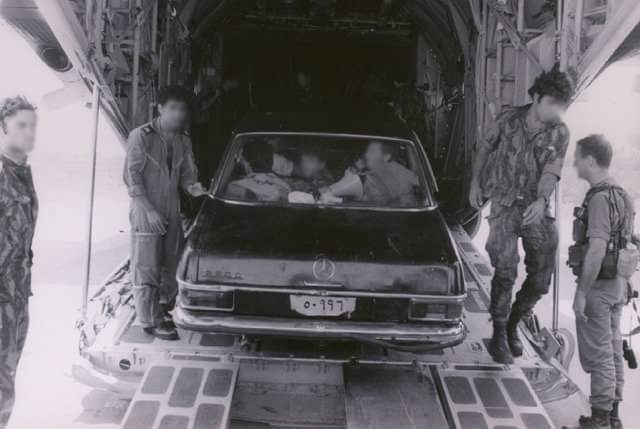On this day, 1976, Operation Entebbe took place after an Air France flight from Tel-Aviv to Paris was hijacked while stopping over in Athens. There were nearly 250 passengers on board, including eighty-three Israelis. Of the four initial hijackers, two of the hijackers were from part of the Popular Front for the Liberation of Palestine and an additional couple were from West Germany’s Leninist Baader-Meinhof Gang. In order to refuel, the plane was first diverted to Benghazi, Libya, where it landed just after 1:00 PM on June 27th.
Despite the fact that Libyan authorities later claimed they did not allow the plane to refuel, it took off after nearly six hours in Libya and flew towards Amman, Jordan before redirecting and landing in Entebbe, Uganda at 3:15 AM on June 28. The hijackers were joined by three additional terrorists at Entebbe and demanded the release of fifty-three Palestinian militants being held in Israeli, French, Swiss, and Kenyan jails.
Today marks the 47th anniversary of the dramatic and daring rescue operation in Uganda by IDF commandos who saved more than a 102 hostages held by pro-Palestinian terrorists at Entebbe airport. 3 hostages were killed, 10 were wounded. pic.twitter.com/m82tMq6QSL
— Shirl the Sabra (@sabra_the) July 3, 2023
After releasing over 100 of the hostages on July 1st, the terrorists unsurprisingly decided to keep nearly all of the Israeli and Jewish passengers in their custody. Later that same day, the Israeli government announced that they had begun negotiations with the French to secure the release of the remaining hostages. However, the negotiations progressed slowly.
Israeli officials publicly maintained the notion that they were continuing to negotiate with the hijackers, but at the same time, a secret rescue operation, named Operation Thunderbolt, was being quickly developed by the Israel Defense Forces. Israel had information about the situation at the airport from local informants and also possessed certain blueprints of the Entebbe airport because an Israeli construction company was the contractor hired to build it.
4 July 1976 - Operation Entebbe or Operation Thunderbolt was a successful counter-terrorist hostage-rescue mission carried out by commandos of the Israel Defense Forces (IDF) at Entebbe Airport in Uganda . Benjamin Netanyahu's brother Yoni was killed in the Operation. pic.twitter.com/GHDIzt3s3y
— Israel Kicks A** (@Israelkicksass) July 4, 2023
At 1:00 AM on July 4th, a team of 200 elite military forces of the Sayeret Makhtal unit landed at Entebbe, surprising the terrorists, and Ugandan soldiers who had joined them. The battle lasted just thirty-five minutes; all seven hijackers and twenty Ugandan soldiers were killed, as were three of the hostages. The only Israeli casualty was the operation’s leading commanding officer, Yonatan Netanyahu, the older brother of Israel’s current Prime Minister, Benjamin Netanyahu. Thereafter, Yonatan was recognized as an Israeli National Hero, and his story is taught in Israeli public schools to this day. The operational success was widely reported on and even received praise from US President Gerald Ford and West German Chancellor Helmut Schmidt. The rescue happened to fall on the US’s 200th celebration of Independence.


